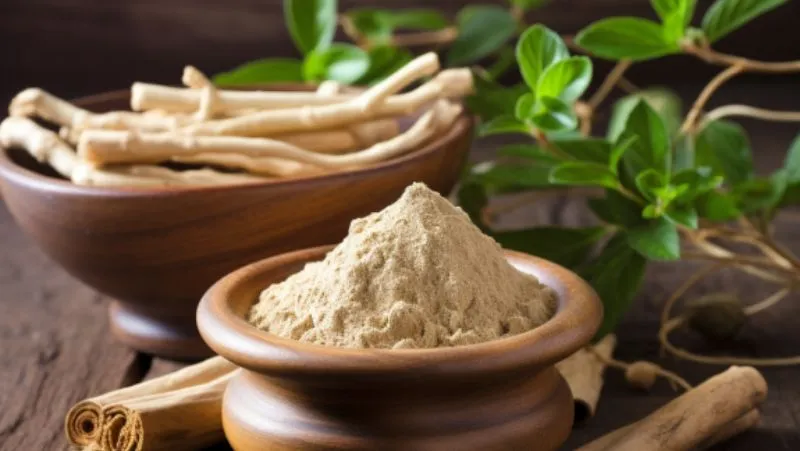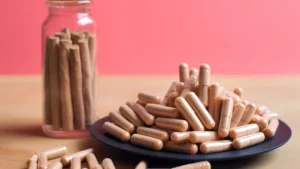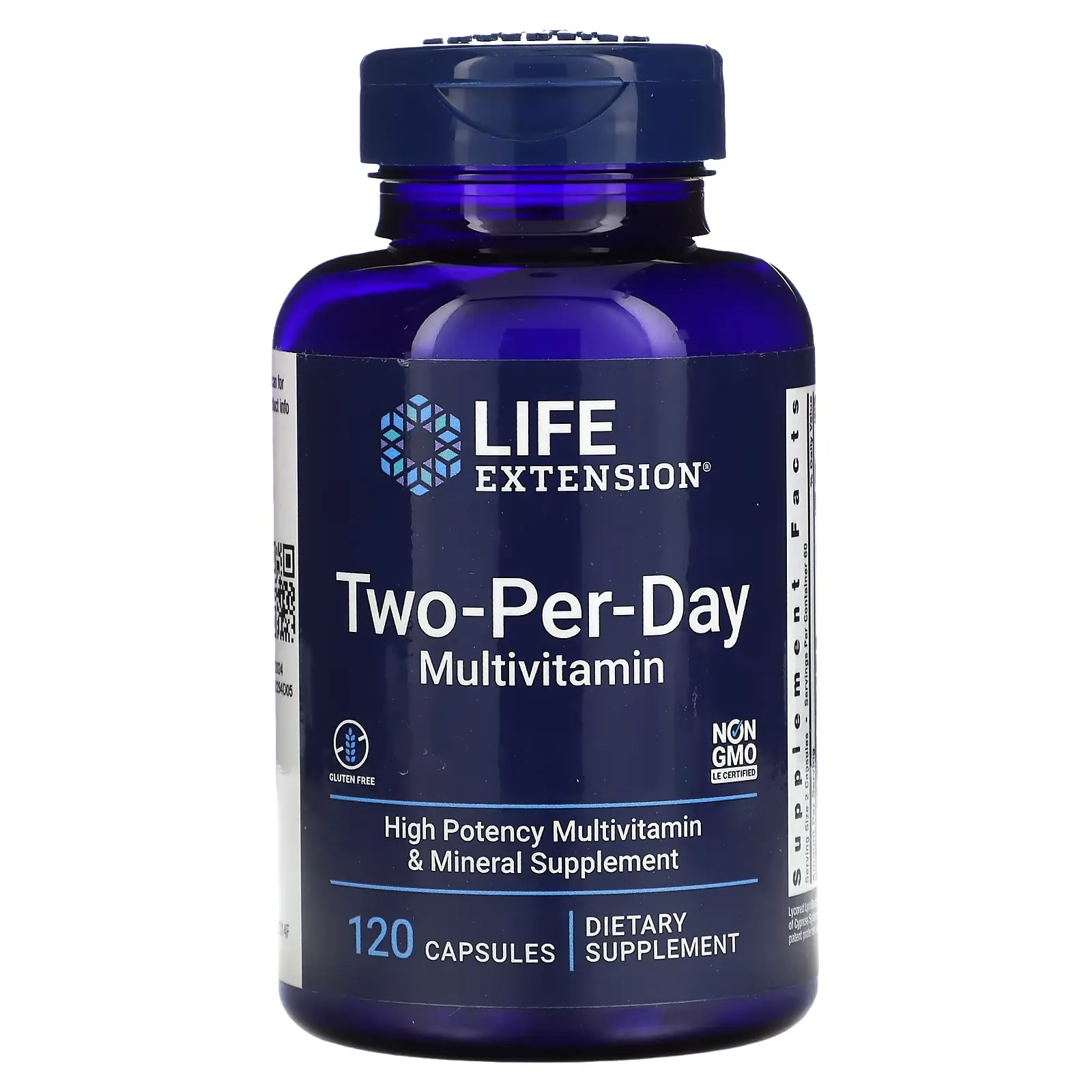Spoiler for this article: 300 mg of ashwagandha twice a day made a big difference.
."sleepis shallow and I feel kind of lost every morning."
I woke up and by the time I got out of the futon, I realized an hour had passed."
I really want to get up and be active! I want to get up early and do something!"
sleepMany people today suffer from
It takes too long to commute,sleepFor some, it is impossible to take enough time.
That was my pattern, too.
managerAlso,ashwagandha (type of Indian cactus)Before I started takingsleepWe were troubled by the low quality of the
If you are reading this article right now and have even a vague concern like ↑, please read this article.
This article may help you sleep better and have a more pleasant morning than the average person.
Please read to the end.
What is ashwagandha in the first place?

ashwagandha (type of Indian cactus)(scientific name: Withania somnifera Dunal) has been used for thousands of years in Ayurveda, the traditional medicine of India, to treat both physical and mental health problems.stressThe herb has been used as an effective medicine, tonic, and even aphrodisiac.
Nowadays, the effectiveness of these products has been proven by modern science through various clinical studies, and they are attracting attention.
The fruit is an evergreen shrub of the eggplant family. The name comes from the horse's (ashwa) smell (ganda).
Some say it is named after the robust vigor of horses.
▼Recommended Articles

Study: Patients with insomnia and anxiety
We are pleased to announce that in 2019 we will be presenting."Efficacy and Safety of Ashwagandha (Withaniasomnifera) Root Extract in Insomnia and Anxiety: A Double-Blind, Randomized, Placebo-Controlled Study)"This is a study that
Insomnia and anxiety patientsfor theashwagandha (type of Indian cactus)Efficacy and safety ofExamine the
What to look for
- For patients with insomnia and anxiety
- ashwagandha (type of Indian cactus)Efficacy and safety of
- ashwagandha (type of Indian cactus)is an alternative to current insomnia medications?
Insomnia is a disease that can seriously damage both the mental and physical health of modern man.
However, most insomnia medications that are currently availableside effectThis brings us to the following.
In this experiment, we worked with insomniacs and anxious patients.ashwagandha (type of Indian cactus)andWhether it is an effective alternative to insomnia medicationsThe objective is to confirm that the
side effectWe will also verify the presence and safety of
Now that we have identified the objectives, we will review the basic conditions of the study.
research data
- Study Duration:10 weeks
- Intake:KSM-66ashwagandha (type of Indian cactus)300 mg twice a day, morning and evening. Total 600 mg.
- Research Participants:60 men and women between the ages of 18 and 60 with insomnia and anxiety
The placebo group also received the same amount of placebocapsuleI have been drinking the
The duration of the experiment is approximately two and a half months. I see that the study participants are drawn from a wide age range.
KSM-66ashwagandha (type of Indian cactus)or 300 mg twice a day, morning and evening, and so on, in general.supplementThe feature of the verification is that the dosage and administration of the product is verified as it is.
Under the above conditions,sleepHow has the quality of the This is examined from a variety of perspectives, including
5 main measurement methods
By "length of mid-awake state," you mean the amount of time you're still groggy after waking up. The shorter it is, the better.
Study Results: Significant Improvements in Sleep Efficiency
Conclusions,ashwagandha (type of Indian cactus)school (e.g. of ikebana)sleepefficiency has been greatly improved.
side effectThere were no specifics = safe to use.
Ashwagandha 300 mg twice daily with significant changes.
- sleep: : TheMay induce
- Safety:high
- Sleep-in time:improvement
- Insomnia:May improve
- Anxiety neurosis:May improve
ashwagandha (type of Indian cactus)in order tomelatonin(in Japanese history)sleep(triggering substance), and the majority of those who have tried it are satisfied with the results.
ashwagandha (type of Indian cactus)The first time they take "Sleep well! The first time they take
This study was conducted using commercially availablesupplementand the same conditions (KSM-66(300 mg per dose) in the following table is verified.
Insomnia andsleepIf you are struggling with the quality of the product, we recommend that you first reproduce the dosage of this experiment.
'Insomniacs and anxiety sufferers.sleepMay" be useful to improve parameters" ← Further large scale studies are needed.
Comparative chart of sleep effects of ashwagandha and placebo
ashwagandha (type of Indian cactus)Compare the values of the pairs with those of the placebo group.
Time to fall asleep
First.ashwagandha (type of Indian cactus)ingestion group and the placebo ingestion group.Time to fall asleep(also sleep onset latency) comparison.
![[Comparative Image] Ashwagandha and Sleep: Numerical Comparison of Time to Sleep](https://ashwagandha-lab.biz/wp-content/uploads/2022/03/Comparison-of-Ashwagandha-and-placebo-on-sleep-onset-latency-1024x633.jpg)
| Time to fall asleep | ashwagandha (type of Indian cactus)intake group | Placebo intake group |
|---|---|---|
| at the start | 41.62 min. | 41.95 min. |
| After 5 weeks | 35.18 min. | 38.11 min. |
| 10 weeks later | 29.00 min | 33.95 min. |
| variation | -12.62 min. | -8.00 min |
Both groups initially took 41 minutes to fall asleep.
As of 10 weeks later,ashwagandha (type of Indian cactus)29 minutes for the intake group and approximately 34 minutes for the placebo group.
Approx. 5 min,ashwagandha (type of Indian cactus)group were able to fall asleep earlier.
Total sleep time (minutes)
Continue,ashwagandha (type of Indian cactus)pairs and placebo pairs.allsleepHours.Here is a comparison of
![[Comparative Image] Ashwagandha and Sleep: numerical comparison of total sleep time](https://ashwagandha-lab.biz/wp-content/uploads/2022/03/Comparison-of-Ashwagandha-and-placebo-on-total-sleep-time-1024x633.jpg)
| allsleepHours. | ashwagandha (type of Indian cactus)intake group | Placebo intake group |
|---|---|---|
| at the start | 261.77 min. | 263.00 min. |
| After 5 weeks | 290.92 min. | 276.16 min. |
| 10 weeks later | 311.62 min. | 292.37 min. |
| variation | +43.85 min | +29.37 min |
Both groups initially about 260 minutes (= 4 hours and 20 minutes)It is.
As of 10 weeks later,ashwagandha (type of Indian cactus)The pair lasted approximately 311 minutes (5 hours and 11 minutes), ,Placebo group was about 292 minutes (4 hours 52 minutes)The following is a list of the most common problems with the
ashwagandha (type of Indian cactus)The group ofNearly 20 minutessleepThe time is getting longer.
ashwagandha (type of Indian cactus)Focusing on the intake group,More than 40 minutes at the beginning and endsleepTime VaryingI did.
as (it) isashwagandha (type of Indian cactus)If you continue to take the "I", you can expect to improve your insomnia.
Length of mid-wake
Mid-awake (the time between waking up and fully awakening the head)Here is a comparison table of
![[Comparative Image] Ashwagandha and Sleep: numerical comparison of mid-wake times](https://ashwagandha-lab.biz/wp-content/uploads/2022/03/Comparison-of-Ashwagandha-and-placebo-on-mid-wake-time-1024x633.jpg)
| Mid-awake (minutes) | ashwagandha (type of Indian cactus)intake group | Placebo intake group |
|---|---|---|
| at the start | 42.69 min. | 44.00 min |
| After 5 weeks | 38.21 min. | 41.84 min. |
| 10 weeks later | 33.05 min. | 40.00 min. |
| variation | -9.64 min. | -4 minutes |
Both groups,Around 43 minutes at first.It is.
As of 10 weeks later.ashwagandha (type of Indian cactus)A pair takes about 33 minutes., ,The placebo group is approximately 40 minutes.
ashwagandha (type of Indian cactus)The pair also shortened the time between waking up and getting their heads out of their asses.
Do you get sleepy while awake during the day?
nextMental alertness upon awakening."The following is a list of the most common problems with the
Do you stay awake and crisp during the day?"Yes.
The respondents were asked to rate themselves on three levels: "normal," "somewhat sleepy," and "very sleepy."
| Mental arousal upon waking | ashwagandha (type of Indian cactus)Intake group: 39 persons | Placebo intake group: 19 participants |
|---|---|---|
| at the start | ||
| usually | four people | four people |
| somewhat sleepy | 23 people | Eight. |
| Very sleepy. | 12 people | seven people |
| 5 weeks | ||
| usually | 25 people | 10 people |
| somewhat sleepy | 11 people | Six. |
| Very sleepy. | three people | three people |
| 10 weeks | ||
| usually | 27 people | 10 people |
| somewhat sleepy | 11 people | seven people |
| Very sleepy. | one person | two people |
Since there is a difference in the number of people in the group, you should be aware of the proportions.
At the beginning, few people answered "normal," and a large percentage of them felt sleepy even when awake.
However, as of five weeks laterashwagandha (type of Indian cactus)graphic rendering (esp. in computer graphics)25 out of 39 "normal"He responded.
In addition, after 10 weeksOne respondent said they were "very sleepy."The company is now in the process of
The placebo side also improved to some extent due to the regularity of life in the study.
neverthelessashwagandha (type of Indian cactus)The level of improvement in the group is outstanding.
Sleep Quality
Last but not least,ashwagandha (type of Indian cactus)pairs and placebo pairs.."sleepquality."The following is a list of the most common problems with the
In short, did you sleep well?
![[Comparative Image] Ashwagandha and Sleep: Comparison of Quality of Sleep (PSQI) Values](https://ashwagandha-lab.biz/wp-content/uploads/2022/03/Comparison-of-Ashwagandha-and-placebo-on-sleep-quality-1024x633.jpg)
| sleepquality of a food | ashwagandha (type of Indian cactus)Intake group: 39 persons | Placebo intake group: 19 participants |
|---|---|---|
| at the start | ||
| usually | one person | one person |
| bad | 16 people | Six. |
| Very bad | 15 people | Eight. |
| totally (horribly) bad | seven people | four people |
| After 5 weeks | ||
| Very good | one person | 0 person |
| good | Eight. | one person |
| usually | 10 people | Six. |
| bad | Thirteen. | Eight. |
| Very bad | Six. | four people |
| totally (horribly) bad | one person | 0 person |
| 10 weeks later | ||
| Really good. | one person | 0 person |
| Very good | Eight. | 0 person |
| good | 10 people | two people |
| usually | 11 people | Six. |
| bad | Six. | Eight. |
| Very bad | three people | three people |
There is no improvement at all on the placebo side.
However,ashwagandha (type of Indian cactus)The group that ingested thesleepAbout the quality ofClear overall improvement trendis seen.
■Here's what happened then

Other studies with similar results
."ashwagandha (type of Indian cactus)andsleepThere are other research papers on the subject of
My own speculation and discussion of the research results
The results are satisfactory because they are in line with my own experience.
ashwagandha (type of Indian cactus)The first thing you realize inweight trainingBut not mental stability,sleepQuality improvement of the
ashwagandha (type of Indian cactus)The first night I took the "Mere Old Man", I clearly felt a different and healthy sleepiness.
I remember going straight to bed and being able to sleep right away.
I gave just two tablets to a couple of people at work and they said, "I slept so much better! "I fell asleep so fast!" He said, "I slept so well!
Summary: Ashwagandha is an effective alternative to sleeping pills.
The researchers in this experiment are,ashwagandha (type of Indian cactus)We conclude the following about
Conclusion on Sleep
- ashwagandha (type of Indian cactus)school (e.g. of ikebana)sleepNatural that may inducecompound
- Safety is high.
- 300 mg twice a day, morning and evening, for patients with insomnia.sleepImproved quality of sleep and latency to fall asleep
- Potential candidate for treatment of insomnia and anxiety
He also commented that "the scale of the study was small this time (the number of participants was small), so it might be better to do it on a larger scale to get more accurate data."
'I suffer from insomnia, butsleepThe medicine isside effectI'm concerned about the..."If you are a person who is interested inashwagandha (type of Indian cactus)We recommend that you try the following
A week after I ordered it, I started sleeping well,sleepYou may even spend your days feeling fulfilled by the quality of the
Summary: Ashwagandha is quite effective as a substitute for sleeping pills.
- ashwagandha (type of Indian cactus)school (e.g. of ikebana)sleepEffective as an alternative to medication
- side effectNone in particular
- 300 mg daily, morning and eveningtwice(600 mg in total) is OK.
That's all for this article. Thanks for reading all the way to the end!
Disclaimer
This site is primarily intended toashwagandha (type of Indian cactus)to provide information about the results of the study and not to provide medical advice.
It is not intended to diagnose, treat, or prevent any specific disease or condition.
Always follow professional advice when using the information on this site.
We also cannot be held responsible for any loss or damage that you may suffer as a result of acting on the basis of the information on this site.





